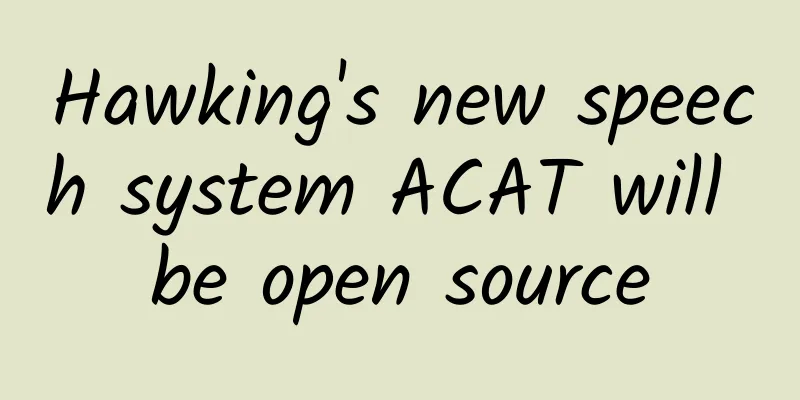Let me tell you how a grassroots programmer can enter BAT

|
This article will tell you step by step from the three aspects of mentality, learning and literacy, how LZ, as a grassroots person who did not graduate from a professional school and came from a third-rate university, entered a first-class domestic Internet company through his own efforts.
Mindset Seeing this title, some students may say, "LZ, aren't you going to tell us how to enter BAT? Why do you start by writing about mentality?" That’s right, the first thing LZ wants to say is mentality! The reason is very simple. If you don't have a good attitude, you can't go on with the learning content mentioned below. So, first pass the mentality level, then talk about other things, otherwise you will definitely die halfway. By the way, many new people in the group like to ask the original poster, "How do you study? Why can't I concentrate on studying? Why do I feel sleepy when I start reading?" There are basically two reasons for the above phenomenon. The first reason is that people are impatient and always feel that reading is useless. After reading, they still feel that they have not learned anything and forget it after a while. The second reason is that people do not have a strong sense of goal and do not know what level they need to reach, so they just "let the bottle half full". As for the first reason, it is a matter of mentality. If you always think that reading books can bring immediate results and transform you from a novice to a master, it would be strange if you don’t fall asleep if you always read books with this mentality. As for the second reason, I think sometimes people need to stimulate their inner desires appropriately. As for the high-class things like having no desires and having no demands, it’s okay to wait until you are in your seventies or eighties. Now, while you are young, it’s not a bad thing to have some desires in your heart, as long as you don’t let the desires blind you. Speaking of desire, I think it is necessary to show you my original desire. I believe that from this email, you can feel my desire at that time. This kind of desire will motivate you to move forward, but you must remember to adjust your mentality and guard against arrogance and impatience on the way forward. study After talking about mentality, let's talk about learning. It's still the same old rules. Since the author comes from Java backend, the following content will be closely related to Java backend. Students who are not from Java backend can refer to it appropriately, but do not copy it. Since we are going to talk about how to enter BAT in this article, let's talk about learning from the perspective of an interview. I will talk about the requirements of first-class Internet companies for Java back-end programmers, and accordingly, I will also talk about how to meet such requirements. For the sake of simplicity, LZ divides these requirements into three levels, namely basic requirements, optional requirements and bonus requirements. Next, let's talk about them one by one. 1. Basic requirements The basic requirement is the knowledge you must learn, and most of the content here is likely to appear in the interview. Therefore, you have no choice but to learn it. You can spend a year, ten years, or even until you die. 1) The basic part of the language: The first basic requirement is, of course, the basic part of the language. The basic part is actually the syntax and the functions of some keywords, such as some basic syntax such as if/else and for loops, and some basic keywords such as new, class, and public. In most cases, interviews rarely ask about this part, because as long as you have written Java for a few years, there is basically no problem with this part. The focus of the basic part is actually mainly on keywords such as static, final, transient, volatile, as well as high-level syntax such as inner classes and generics. When it comes to static, the most important thing to remember is that the variables referenced by static in the class attributes will be used as the root node of GC. Being a root node means that this type of variable will basically not be recycled. Therefore, static can easily introduce the risk of memory leaks. If an interviewer asks you to explain the static keyword, and you tell him that static can modify properties, methods, and inner classes, and what effects the modification has, then the interviewer will basically not remember your answer, and the overall impression will be mediocre. But if you add that you once encountered a memory leak problem, which was caused by a statically modified Map type variable, and finally checked the stack information to find the problem and solve it, then the interviewer's impression of you will naturally improve. Moreover, a deeper understanding of static is that static will directly reference the referenced properties, methods, and inner classes to the class rather than to the instance of the class. That is why you can use class name.property, class name.method, and class name.inner class name to directly reference a property, method, or inner class modified by static. If you don't use the static modifier, then you must use instances to reference these methods, properties, or inner classes, the most typical example being inner classes. I believe many students have wondered why an inner class that is not modified by static must be declared this way. OututterClass.InnerClass innerClass = new OututterClass().new InnerClass(); Because you did not use static to modify InnerClass, you must create an instance of OuterClass before creating an instance of the inner class, because the inner class can only be referenced through an instance of the outer class. If you use static to modify it, you can use the inner class in this way. OutterClass.StaticInnerClass staticInnerClass = new OutterClass.StaticInnerClass(); The biggest difference between these two methods is that in the first method, if you want to get an instance of InnerClass, you must have an instance of OuterClass, so in fact you create two instances in this way, so there are two new keywords. The second method is easier to understand. Static inner classes do not depend on the existence of outer class instances, so you only need to directly create an instance of the inner class, so there is only one new keyword. I have talked a lot about static, but I actually not only talked about the static keyword, but also roughly talked about the syntax of inner classes. Then, there is another thing in the basic part that is more challenging, which is the volatile keyword. The key words of this keyword are visibility. But during the interview, if you say visibility, you can only get 20 points out of 100. The remaining 80 points will depend on your hard work. The so-called hard work is actually to understand what visibility means in concurrency. So, in order to understand what visibility means, you need to understand what main memory and working memory are. Only when you understand these concepts, you will know the real role of volatile. However, one thing I want to remind you is that volatile does not guarantee synchronization, so you must remember this. Not only when dealing with interviewers, but also when actually using volatile, you should pay attention to this point, otherwise it is easy to cause problems. Okay, that’s all I have to say about the basics. I have picked out some representative ones to talk about. In the final analysis, this part requires you to have a very clear understanding of the keywords and syntax in Java. The so-called understanding here means a clear understanding of its implementation principles, rather than simply knowing how to use it. 2) Java Runtime Environment Java Runtime Environment is the Chinese translation of JRE, which essentially refers to JVM. First of all, we must know about JVM and the relationship between JVM and Hotspot. JVM refers more to the JVM specification, while Hotspot is an implementation of JVM and the most commonly used JVM implementation. You can think of JVM specification as an interface and Hotspot as an implementation class, which is easier to understand. In addition, the three most important parts of JVM must be very clear: memory division, class loading mechanism and GC strategy. Understanding these three parts is not only for interviews, but also for you to have a deeper understanding of Java, which is very helpful for your Java career. Moreover, there is one more thing to note about memory partitioning. The partitioning method we often talk about actually refers to the Hotspot partitioning method, not the one specified by the JVM specification. Hotspot's memory is simply divided into three parts: Young Generation, Old Generation, and Perm Generation. The Young Generation is further divided into Eden, From, and To, where From and To are collectively referred to as Survivor Spaces. Under normal circumstances, from creation to destruction, an object should go from Eden, then to Survivor Spaces, then to Old Generation, and finally disappear under a certain GC. Of course, an object may die directly in Eden, or it may always survive in the Old Generation. These are all possible. Regarding memory division, you can use memory analysis tools, such as jmap, jvisualvm, etc., to observe the memory changes in each area and understand it based on the actual situation. You can learn about the classloader mechanism in conjunction with Tomcat to understand the classloader mechanism of Tomcat and see how Tomcat ensures class isolation between apps. If possible, you can look at the source code of the classloader in Tomcat, or look at an open source project of LZ, niubi-job, which also contains parts similar to the classloader mechanism of Tomcat. As for GC, you need to know what GC Roots are and how to determine whether an object can be recycled. In addition, you also need to have a general understanding of GC algorithms and strategies. 3) Concurrency knowledge and concurrent package If you want to enter a first-tier Internet company, you must know this content. Otherwise, you will always stay at a relatively low level. The two most important concepts to understand about concurrency are visibility and atomicity. Visibility is closely related to the volatile keyword mentioned above. Visibility is just a concept in the field of concurrency, while volatile is a keyword in the Java language that actually guarantees the visibility of variables. As mentioned before, to understand visibility, we need to understand main memory and working memory. Main memory and working memory actually belong to the knowledge scope of JVM. So from here we can see that all knowledge is related. Compared with visibility, atomicity is actually easier to understand. I believe that the ever-changing example of bank transfer transactions is enough for most people to understand the concept of atomicity. It actually means that one or more operations are regarded as a whole. After you have the basic knowledge of concurrency, you need to study the concurrent package. The content in it is actually a treasure trove. Once you need to write concurrency-related functions, you will find that the content in it is very practical. Among them, ConcurrentHashMap is the class that is most likely to be asked about in interviews. Almost all interviews will ask you what is the difference between ConcurrentHashMap and ordinary synchronized HashMap. In fact, you only need to know two things about this problem. One is the data structure of HashMap, and the other is the lock segmentation technology. I will not explain the details here. You can find the relevant information yourself. In addition, there is a very important class in the concurrent package called AbstractQueuedSynchronizer. Almost all concurrent tool classes in the concurrent package are extended based on this abstract class. Therefore, a thorough study of the AbstractQueuedSynchronizer class will greatly help you understand the concurrent package. Finally, a question that is often asked during interviews is what is the difference between ReentrantLock and synchronized keywords. I remember that I asked this question many times in the YY interview activities I organized before, but almost no one could answer it. This can only mean one thing, that is, most people don’t consider which one is better when using synchronized and ReentrantLock. In fact, the difference between them is very simple. To put it simply, synchronized is more efficient because it is a mutual exclusion implemented by the underlying JVM. ReentrantLock has more functions than synchronized, such as timed acquisition of a lock, multiple waiting conditions, etc. Concurrency is an important part of a programmer's advancement. I hope all Java programmers can pay attention to this part. 4) Design Patterns and Reflection I personally think that design patterns and reflection are parts that high-level programmers must master. Using this knowledge well can help you write less code in actual development and make the program structure better. I won't go into much detail about design patterns here. Regarding reflection, it's actually the contents of the reflect package. The classes in this package are not difficult to learn. The main thing is to use them more and read more. For example, the most commonly used spring framework in the Java field is actually full of design patterns and real-world use cases for reflection. If you study it more, you will definitely benefit a lot. 5) File IO, NIO, network IO and network protocols File IO, NIO and network IO are also frequently used parts in work, so they must be mastered. Among them, NIO is more about understanding its principles. In addition, there are multiple protocol implementations in tomcat, including BIO, NIO and APR. The differences between these three must be very clear, which can be configured in the protocol attribute of the connector. As for the network IO part, it is actually the content in the net package. The content in it is very commonly used. For example, if you call HTTP-API, you need to use the classes in it. In this era of restful-API flooding, you have to use the HTTP protocol to call API. In addition, when understanding this part, you should also have a proper understanding of the network protocol. The most typical TCP and HTTP protocols must be understood. In the interviews that I participated in, TCP protocol was basically a question that I would definitely be asked about. Although this may be related to the fact that I wrote TCP protocol on my resume, I still need to understand some knowledge such as the TCP protocol's retry mechanism, the three-way handshake process, and the difference between TCP and UDP. As for the HTTP protocol, it is relatively simple. The application layer protocol mainly requires knowing its protocol format, such as which headers are supported, what each header means, and so on. 6) Summary Well, that's it, the basic requirements are almost complete. Yes, in fact, the basic requirements require you to have a solid Java foundation. This is also the requirement that all first-tier Internet companies will basically write in the first few requirements of the recruitment. Therefore, if you want to enter BAT, you must understand this part of the content, and this part of the content is also very helpful for your actual development, not just for coping with interviews. Optional Requirements Seeing the words "optional requirements", many people may think that this part is not important. But I can tell you responsibly that this part is often the important indicator that determines whether the company wants you. Because after the basic requirements are met, the company's main criteria for selecting talents is actually the optional requirements. LZ once mentioned the word "differentiation", and in fact this part is the embodiment of differentiation. Next, I will show you what optional requirements there are. In addition, I want to point out in advance that there is no must-know or must-not content in these optional requirements. It is always a good idea to learn as much as possible. 1) Spring, Mybatis framework There is no need to say much about the framework part. If you can master the principles and source code of the spring and mybatis frameworks, then this will definitely become a huge advantage for you. If you are a Java backend ape who specializes in WEB development, then you must use the Spring and MyBatis frameworks. Being proficient in Spring and MyBatis frameworks is not only for interviews, but also of great help to your daily development. You can do a lot of architectural optimization and save a lot of repetitive work for your comrades. Regarding the Spring framework, the core is of course IOC, followed by AOP and MVC. Studying the source code of these three parts carefully will make you stand out from most programmers. As for the mybatis framework, the main focus is on how it implements dynamic SQL. Moreover, after you have studied it thoroughly, you can try to reinvent the wheel yourself, and you may get unexpected results. 2) Linux Server This part is actually what operation and maintenance should be proficient in, but as a Java backend ape, if you can master Linux servers, it will be of great help to you in troubleshooting online problems. Most programmers only know some common Linux commands, and have no idea about the file system, network, IO, etc. of the Linux system itself, including me. However, I have seen some programmers around me who are very proficient in Linux. This is not only reflected in knowing a few more commands, but also in their understanding of the entire Linux system. It is foreseeable that these people will find it easier to find the root of the problem when troubleshooting. Because program problems are often not the most difficult to solve. Once you have seen many exceptions, you will know what is going on. At most, you can always find the cause by looking at the source code. The most difficult to solve are environmental problems, which are nothing more than problems at the operating system level. Obviously, in most cases, the operating system that Java runs on is Linux. 3) Database optimization After talking about Linux, the next thing I want to talk about is the database. This is originally the part that the DBA should be proficient in, but as a Java backend ape, the database is basically the one I deal with most frequently. And everyone knows that the performance bottleneck of an application often appears on the database side. Therefore, if a Java backend ape can be proficient in the database, it will be of great practical help to your work. I believe that many people have encountered the situation where SQL is too slow. At this time, how to optimize the SQL execution time to an acceptable range by adding indexes, SQL analysis and optimization is actually quite challenging. Anyway, I'm about the same level with this stuff. Basic optimization is no problem, but slightly more complicated ones are not. Therefore, this part is enough to become your advantage and reflect your difference. 4) Message Service In addition to Linux and databases, messaging services are also an essential component in today's Internet companies. Common messaging components include rabbitMQ, activeMq, and some other open source messaging components, such as rocketMq. Any of these, if you can master their principles, will also become your strong competitive conditions. In fact, the focus of message service is nothing more than how to ensure eventual consistency, message order, including message transactions and other issues. Although I don’t know much about this, I am sure that if you can have your own unique insights in this part, it will greatly increase your success rate. 5) Cache service After talking about the message service, I believe everyone must be familiar with the cache service. Common caches include memcached and redis. If you can understand one of them, it will also give you a lot of extra points. After all, cache is indispensable for current Internet applications, so if you can fully hold the cache part, then you will be different. In cache services, there are several common problems, such as what to do when the cache is full, how to handle the real-time performance of the cache, how to plan the memory structure, how to handle cache hit problems when adding or deleting nodes in a distributed environment, etc. 6) Load Balancer Load balancer, this is the last optional requirement. There are two common load balancers: one is soft load balancing, such as nginx, Apache, lvs, etc. The other is hardware load balancing, the most common one is F5. Both methods have their own advantages and disadvantages. Hardware load balancing is used for simple applications with large traffic, while software complex balancing is mainly used for complex applications with small traffic. Of course, there is another difference between the two that must be considered: hardware complex balancing is generally very expensive, while software load balancing has basically no cost. There are also some common problems with load balancers, such as how to maintain sessions, how to control traffic, what load balancing strategies are available, how to check the health status of backend servers, etc. 7) Summary Okay, that’s about it for the optional requirements. Careful friends will find that these 6 requirements actually correspond to some of the most common things in Java backend development, such as spring, mybatis framework and database, which are basically what every Java programmer has come into contact with. The other four include Linux server, message service, cache service and load balancer. It is the same. Everyone should have come into contact with these things to a greater or lesser extent in actual work. But I believe that there are not many people who can really understand and master one of them. Because of this, if you can do it, you can show your difference, which may be one of the important chips for you to get the offer. However, I must emphasize here again that most people have some understanding of these things, including the questions mentioned by me above, and many people also know the answers. However, knowing the answer alone is far from enough. This is not enough to become your advantage. You need to have a deep understanding of these issues and have your own unique insights to make it your advantage. III. Bonus Points Requirements The last one is the bonus requirements. Although the bonus requirements are not as important as the basic requirements and optional requirements, it is similar to the optional requirements. Often, the ultimate reason for getting an offer is precisely these parts that seem to be non-necessary requirements. Next, I will show you the parts that can add points. It should be emphasized that some of these additional points requirements may become basic requirements in some special cases. 1 ) Data structures and algorithms There is no need to say more about this part, everyone knows it. Being proficient in data structure and algorithm will definitely become a highlight of your career. Because most programmers don't have a good foundation in this area, including myself. If asked questions about algorithms during the interview, I can basically say two words: I don't know. I have read some source code of Java collection framework before, and I have a certain understanding of some commonly used data structures. But now, I have basically forgotten everything, and I may not even be able to write the most basic bubble sort correctly. Therefore, it is foreseeable that data structure and algorithm are definitely a plus point. Moreover, when you are interviewing for some algorithm-related positions, this plus point requirement may become a basic requirement. 2) Computer operating system The principles of computer operating systems are very basic content. This part is more difficult, as it discusses some of the most basic underlying principles, such as memory, instructions, system IO, etc. If you can study the operating system thoroughly, then during the interview, you can use this as a breakthrough point to showcase your strengths. 3) Computer Network In fact, the network part is still quite important for programmers. What I am doing recently often encounters some network problems. Although many times these problems can actually be solved by specialized network personnel, if you don’t know enough about it, it will still cause great obstacles to your work. Moreover, if you want to master the TCP/IP protocol, it is still difficult to truly understand it if you don’t understand computer networks. Therefore, if you can master the computer network part, it will definitely be a plus for you. 4) Be proficient in a scripting language Scripting languages are very convenient and practical in many cases. LZ has been forced to use Python to do a lot of things recently. In fact, after using it, you will find that although Java can also achieve the same purpose, choosing the right language will save you a lot of energy. Therefore, if you can proficiently use a scripting language, such as Python, shell, etc., this will definitely be a plus for you. 5) Your github and blog I believe most people know this. If you have your own github and blog, and there are a lot of valuable content in it, then it will definitely add a lot of points to you. Moreover, speaking of github and blogs, I have a real story about myself, which I will share with you at the end of the article, so I won’t mention it here for the time being. In addition, let's not talk about interviews. It is also very beneficial to write code on GitHub, write articles in blogs, and summarize your own technology and career. I believe that many friends have already experienced the benefits of this, so I won't say more. After all, there is no point in talking too much. The most important thing is to actually do it. If you hope to get extra points in this regard, then start now and stick to it. 6) Summary At this point, the requirements for extra points have been explained. In fact, there are many things that can add points, and I just listed the more common ones. For example, if you have a background in other first-tier Internet companies, this can also add points. However, this kind of extra points is more difficult to achieve, and here I am talking more about grassroots programmers, so I won’t say more here. In general, bonus requirements, like optional requirements, are the key to your success, so if possible, you should still put some effort into the bonus requirements. Learning Summary That’s about it for the learning part. In fact, most first-tier Internet companies have only two technical requirements for recruiting: a solid Java foundation and a special skill. A solid Java foundation is actually the basic requirement in this article, and having a special skill is actually just choosing one of the optional requirements or the bonus requirements. Of course, it is undeniable that the more optional requirements and bonus requirements you know, the higher your success rate will be. However, if you have no advantages at all, even if you have a solid Java foundation, it is actually difficult to get in, because there are too many people like you and you cannot stand out among many interviewees. Although it is possible that you were extremely lucky and the company was in urgent need of people at the time and there were no other better interviewees, which led to you getting the offer by luck, the probability of this happening is really too small after all. All in all, the knowledge is there and it will not run away or move. It depends on whether you learn it or not and when you learn it. Some people achieve this within one or two years after graduation, some people take three to five years to achieve it, and some people never achieve it in their entire lives. What kind of programmer you want to be depends entirely on you. Literacy After talking about mentality and learning, let's talk about the qualities a programmer should have. Although this part may not be helpful for interviews, sometimes I think it is more important than technology because it may affect the development of your career as a programmer. 1. Coding style When it comes to a programmer's qualities, the first one is the coding style. Although there is no absolutely correct coding style, you should gradually form your own coding habits, and they must be good habits, while meeting the basic Java coding style. To give the simplest example, no matter how good you are, if you use pinyin to name your variables, then others will definitely think of you as a very low-level programmer. In fact, programmers are sometimes very similar to artists. An artist who focuses on painting usually has his own style. To exaggerate a little, maybe someone can recognize his paintings as long as he takes them out. This is actually a style. As a programmer, you should also have your own coding style. Although at work, in order for everyone to communicate better through code, you more or less need to make some compromises and maintain a consistent style with everyone. But your own open source project should be your work of art. While you are polishing it, you are actually forming your unique coding style. Moreover, sometimes, your open source project may directly or indirectly help you get a good offer. 2. Writing skills Some people may be surprised to see this, but I personally think that writing ability is a quality that a programmer should have. Coding style is only the quality of your coding skills. You also need to have the ability and quality of writing. Documentation and comments are also an important criterion for whether a programmer is professional. Because no matter how good your skills are, what others see besides your code is your documentation and comments. Whether this part is well written often directly determines others' impression of you. Therefore, writing ability is actually a quality that a programmer should have, at least I have always believed so. Because no matter how good a person's skills are, if his documents and comments are a mess and do not reflect the word professional, then his image will definitely be greatly reduced in my mind. Conclusion This article briefly discusses how to enter BAT from three aspects: mentality, learning, and literacy, but in fact, this is also a process for a programmer to learn and improve himself. When mentioning github and blogs, I said that at the end of the article, I would tell everyone a true story about myself. In fact, this story is my true experience of coming to Hangzhou. The reason why I was able to join my current company is largely because I have a frequently updated blog and a github that has built several wheels. In fact, I am really lucky, or it can be said that my usual hard work has brought me good luck. More than two years ago, I really wanted to join the middleware team, but I never received a response after sending out my resume. So I wrote a job application email to the leader of the middleware team, stating that I really wanted to join the middleware team and do work serving technical personnel, and hoped to get an interview opportunity. Unfortunately, the senior in the middleware industry did not reply to my email. I thought it was because my resume did not impress him. But I later found out that it was because the senior had already left the middleware industry. However, two years later, after the Chinese New Year in 2016, I accidentally received a text message in my blog, which was an invitation from a member of the middleware team. As you can see, this message was received by me after the Chinese New Year. At first, I didn't notice this message. It was not until I had been working for ten days after the Chinese New Year, almost March, that I noticed this message in my message box. I clearly remember that it was a Thursday when I saw it. I was very surprised when I saw it. Although I had no plans to change jobs at that time and had never submitted a resume during that period, I still sent my resume to this senior on the same day out of the principle of not wasting time talking. Unexpectedly, in just two days, Thursday and Friday, I went through four rounds of telephone interviews in succession. I learned from my seniors that I passed the interviews very smoothly and just had to wait for the offer. To be honest, when I heard the news, I felt like I was dreaming. A day or two ago, I was still in the period of adjustment after the New Year holiday, and was still struggling with how to meet the needs at hand. Suddenly, I had to go to Hangzhou, join the company I had longed for, join the department I had longed for, and start another career. At that time, I really felt that the things in this world were so magical. At that time, the sentence that popped up in my mind unconsciously was, hard work pays off! LZ has written so many articles over time, and finally it was not in vain, as it gave LZ an opportunity. I used to think that sayings like "hard work pays off" were just words to encourage others. But when you really encounter something, you will truly realize that sometimes the truth is so simple, and the difference lies in whether you do it or not. Just like what the author wrote in this article, if you see it and do it today, then maybe one day in the future, you will thank yourself for your efforts today. But if you see it but don’t do it, maybe you will still be the person who complains about boring work and overtime all day long, and then spend your life in mediocrity and complaining about everything. I don't want to give you any chicken soup or pump up your blood, but I want to tell you that the profession of programmer is very fair. I believe that when many people first embarked on this path, they also felt that the profession of programmer was full of the spirit of struggle, and they could change their own destiny through their own efforts, unlike some professions that require relying on one's father. On the road of being a programmer, if you work hard, you will have a great chance of achieving your goals and dreams. If you don't work hard, you will basically stay where you are until you are beaten to death on the beach by the waves behind you. How to choose is actually entirely up to you, as long as you don't regret your decision. So, complain less and take more action. If you can accept mediocrity, then just stay mediocre and live your life happily. Otherwise, you should keep working hard until you achieve your goals one by one. The most frightening situation is that people are full of desires, unwilling to be mediocre, but unwilling to work hard. It is really a pity for such people to become programmers. |
>>: How will 5G change our lives? 1G of data may only cost a few cents
Recommend
20 thoughts on marketing, copywriting, and new media!
1. There is a very famous marginal effect in econ...
4 misunderstandings of ToB operations and 3 ways to acquire customers!
There is a popular saying now: ToB companies do n...
iOS15 Beta5 update, many new improvements, but not recommended
The update package is 6.0.5GB, which may vary sli...
Xiaohongshu KOL promotion: the secret of note flow limitation!
After writing "Little Red Book KOL Promotion...
8 suggestions for 5 pain points in community operations
Community has always been a very hot topic. I stu...
Toutiao officially launches CPA (cost-per-acquisition) model
The conversion cost is sometimes high and sometim...
Why doesn’t the information flow convert? Here’s the reason!
This article only discusses accounts with landing...
Super complete SEM optimization solution! 6,000-word practical case analysis
This article will teach you how to make an execut...
The ninth session of Jiangcheng Stock Market Advanced System Course Training Camp
Resource introduction of the ninth session of Jia...
Refined user retention and funnel analysis methods!
1. Event Analysis The application field of event ...
How can products improve user stickiness? Here are 3 tips
These people used to be our customers, but they d...
How does operations conduct target user analysis?
Steve Jobs said, I never rely on market research,...
11 ways to improve programmers' work efficiency and keep you away from overtime
Are "hardworking" and "working ove...
How to do Christmas marketing? Here are 3 ways and 10 cases
The afterglow of “Double Twelve” has not yet fade...
Old Wang from the west of the village "2022 Sideline Banknote Printing Society"
Lao Wang from the west of the village "2022 ...









